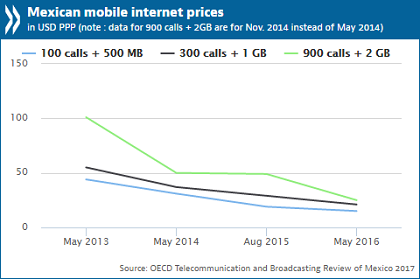Mexico should continue its overhaul of telecoms and broadcasting
Mexico’s 2013 telecom reform has brought tangible benefits, spurring competition that has increased access and brought down mobile Internet costs from among the highest in advanced economies to among the lowest. Mexico should now consolidate this overhaul of telecommunications and broadcasting so that households, businesses and the economy can reap maximum benefits from the digital transformation, according to a new OECD Review.

The OECD Telecommunication and Broadcasting Review of Mexico 2017 credits the legal and regulatory reform with helping create an environment for price reductions of up to 75% in mobile broadband packages, better quality services and the addition of 50 million mobile broadband subscriptions – more than the population of Colombia. The telecom and broadcasting sectors have grown faster than the broader economy since the overhaul.
The Review says Mexico has fully implemented 28 out of 31 recommendations set out in the OECD’s 2012 Review of Telecommunication Policy and Regulation in Mexico, whose advice fed into the reform, and has partially implemented the other three. Mexico should now make further modifications to policy, regulation and the legal framework to keep increasing competition, choice and quality, ensure optimal market conditions and provide incentives for operators to expand services and innovate. It is important to ensure the Federal Communications Institute maintains the independence and powers to meet its mandate.
“Before this reform many Mexicans struggled to pay for long distance calls to relatives and could not afford mobile Internet services that other countries took for granted. Three quarters of households had no Internet access. Today, communication services are much more affordable and millions more people are online,” said Gabriela Ramos, the OECD Chief of Staff and G20 Sherpa.
“This is a great illustration of how better policy can improve people’s lives. I am confident Mexico will show determination in following through with implementing and building on the changes so far, to catch up with leading economies and build a solid basis for a digital future."
Even though the pace of change and transformation after the reform has been outstanding, Mexico still lags behind OECD averages access to internet services, a reminder of how important it is to continue converging to be better prepared to take advantage of the digital transformation.
A sharp drop in the cost of telephone calls and Internet access overwhelmingly benefits poorer families in a country where spending on fixed and mobile phone services in the poorest households averages 10% and 6.2% of monthly income compared with 1.8% and 1.2% in the wealthiest households.
Prices for mobile Internet dropped sharply from 2013 to 2016 so that they now stand below the OECD country average. The price for a low-usage mobile broadband basket of 100 calls and 500 Megabytes fell by 65% from 44.05 USD PPP (at purchasing power parity) to 15.39 USD PPP, while the price for a high-usage basket dropped by 75% from 101 USD PPP to 24.93 USD PPP. The price for a medium-usage basket fell by 61%.
Overall market shares of incumbent operators remain high, but the Review notes a shift in the mobile broadband market, where Telcel’s share has fallen by 12% from 83.8% in 2012 to 71.8% in 2016 following gains made by rivals. The commencement of the “Red Compartida” wholesale wireless 4G network in 2018 should further boost competition.
Progress has been slower in broadcasting, where limited competition and restrictions on foreign investment are factors behind a 5% rise in pay-TV prices over 2013-16. While the permitted threshold for foreign ownership in broadcasters has been raised from 0% to 49%, eliminating the restriction altogether would promote competition and better services, as would taking advantage of convergence over digital networks to promote further competition.
Other recommendations in the Review include:
● Further lower barriers to foreign investment by abolishing the last restrictions in broadcasting and easing requirements for investing in satellite communication services.
● Assess ways to ease regulatory restrictions for the dominant telecoms operator as soon as possible following the implementation of the effective functional separation of the group’s fixed-line retail and wholesale divisions.
● Address the very uneven levels of internet access and quality across Mexican States including by reducing obstacles to infrastructure deployment at the local and municipal level such as over-complex or divergent regulations.
● Encourage more competition in pay TV, including through the elimination of the existing legal fast track for mergers and acquisitions between non-dominant players.
● Improve the functioning of internet exchange points and add additional IXPs throughout Mexico.
● Eliminate the special tax on products and services (IEPS) that is currently levied on fixed and mobile telephony and pay TV services as a way to further foster access and usage.
Source: Organization for Economic Co-operation and Development
- 345 reads
Human Rights
Fostering a More Humane World: The 28th Eurasian Economic Summi

Conscience, Hope, and Action: Keys to Global Peace and Sustainability

Ringing FOWPAL’s Peace Bell for the World:Nobel Peace Prize Laureates’ Visions and Actions

Protecting the World’s Cultural Diversity for a Sustainable Future

Puppet Show I International Friendship Day 2020

